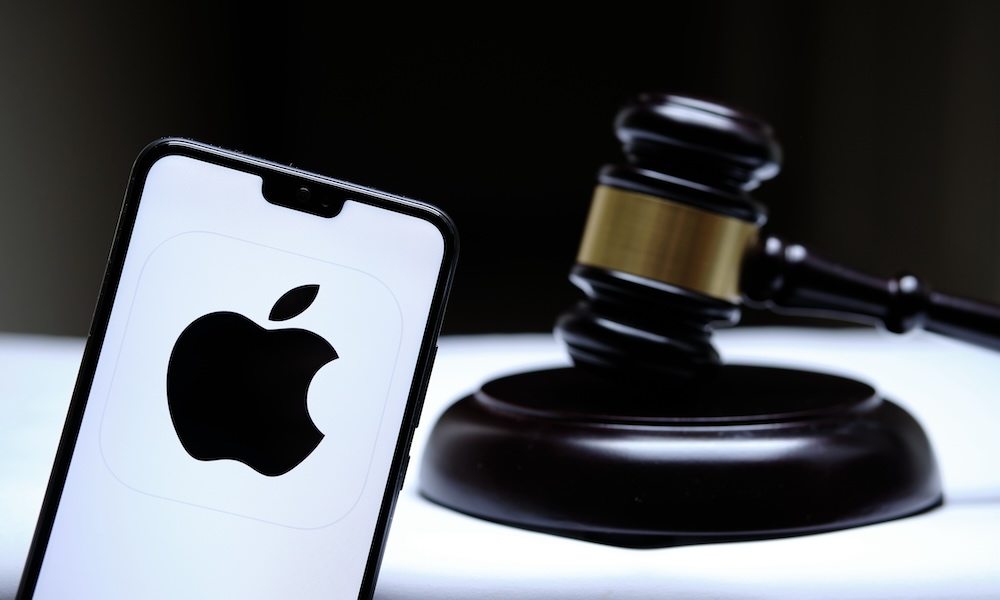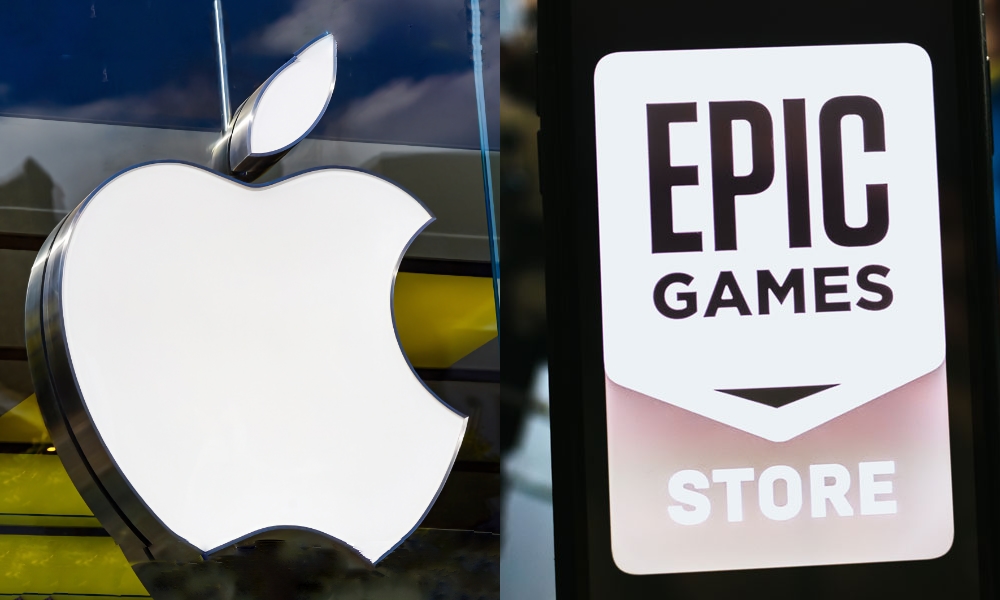Judge Rogers Issues Scathing Ruling Against Apple, Effectively Bans ‘App Store Tax’
 Ascannio / Adobe Stock
Ascannio / Adobe Stock
Toggle Dark Mode
Apple just got smacked down hard in its ongoing legal battle with Epic Games. Despite winning what it once called a “resounding victory” in both the original case and its subsequent appeals, Apple chose to push its luck and not only continue fighting on the one point out of ten on which it had lost but passively defy the courts by finding every way it could to ignore the spirit of the ruling.
To recap, the saga began nearly five years ago when Epic Games baited Apple into a lawsuit. The Fortnite developer began by sneaking its own purchasing system into the iOS version of its game, flagrantly violating its agreement with Apple in a calculated setup. Epic was under no illusions as to how Apple would respond and was clearly angling for that; Fortnite was turfed from the App Store, and Epic had a carefully prepared lawsuit ready to go to accuse Apple of anti-competitive behavior and violation of antitrust laws.
Once the legal battle began, neither company pulled any punches. Apple terminated Epic’s developer account, and when Epic filed a motion asking the courts to force Apple to restore its account and return Fortnite to the App Store pending the outcome of the lawsuit, Apple compared Epic’s behavior to shoplifting products from an Apple retail store , and declared Epic’s claims of an “emergency” as being entirely of its own making. Judge Yvonne Gonzalez Rogers mostly agreed, telling Epic that “you cannot have irreparable harm when you create a harm yourself,” in denying the injunction.
A year later, when the dust settled, Judge Rogers ruled that Apple was not the monopolist Epic had accused it of being, deciding nine out of Epic’s ten claims in Apple’s favor. However, Apple was still found to have engaged in “anti-competitive conduct under California’s competition laws.” This specifically concerned Apple’s “anti-steering” rules, Apple’s extremely controversial App Store policy that prevents app developers from even mentioning the ability of alternative payment methods in their apps.
Judge Rogers handed down a permanent injunction prohibiting Apple from blocking links to other payment methods.
Apple appealed the inunction almost immediately and ultimately won a stay of the order pending the outcome of the appeal. That request was initially denied by Judge Rogers, who ruled that Apple was looking for “an open-ended stay with no requirement that it make an effort to comply.” However, it managed to convince the Ninth Circuit Court of Appeals that it needed more time, and the changes complicated things financially.
That late 2021 argument became key to what’s happened more recently. Judge Rogers’ initial ruling didn’t specifically prohibit Apple from collecting a commission on transactions in apps distributed on the App Store. In fact, Rogers specifically stated that Apple would still be “entitled to a commission or licensing fee, even if IAP was optional.” Apple’s argument to the Ninth Circuit Court was that it would be very costly to create a new payment processing system to track and collect all these commissions, so it was better to wait it out and see what the appellate court ultimately decided.
However, Apple also took full advantage of that loophole. After it lost the appeal and the injunction came back into force, it announced it would charge a 27% commission on all purchases made outside the App Store. The 3% reduction over traditional in-app purchases was ostensibly a concession to credit card processing and related fees being handled by someone else.
Epic Games CEO Tim Sweeney accused Apple of malicious compliance and took the case back to the courts. It landed in the hands of Judge Rogers again, who handed down a ruling earlier today that makes it pretty clear she’s become exasperated by the whole thing — and downright frustrated with Apple.
As reported by The Verge, Judge Rogers ruled today that Apple is no longer allowed to charge any commissions or fees whatsoever on purchases made outside the App Store. Meanwhile, the injunction still stands that Apple can’t block developers from linking to outside purchase systems in any way — not try to discourage users from doing so through “full page ‘scare’ screens.”
Judge Rogers doesn’t hold much back in her strongly-worded ruling, opening with a clear condemnation of Apple’s behavior:
The Court FINDS Apple in willful violation of this Court’s 2021 Injunction which issued to restrain and prohibit Apple’s anticompetitive conduct and anticompetitive pricing. Apple’s continued attempts to interfere with competition will not be tolerated.
“Apple’s response to the Injunction strains credulity,” Rogers continues. Two more sets of evidentiary hearings were held, in which the Court had to order the “production of real-time documents” to “unveil Apple’s actual decision-making process” and “not the one tailor-made for litigation.” After these hearings, Rogers determined that Apple had effectively defied her injunctions deliberately and with no small amount of hubris.
Apple, despite knowing its obligations thereunder, thwarted the Injunction’s goals, and continued its anticompetitive conduct solely to maintain its revenue stream.
“Remarkably, Apple believed that this Court would not see through its obvious cover-up,” in the first set of evidentiary hearings held in 2024, Rogers said. However, the Court did; hence, the second set of hearings was ordered in early 2025.
After the Court found that Apple’s 30 percent commission “allowed it to reap supracompetitive operating margins” that had no demonstrable connection to the value of its intellectual property, Apple’s response was to “charge a 27 percent commission (again tied to nothing),” in Judge Rogers specific words (including the italics for emphasis), with a goal of maintaining its “anticompetitive revenue stream.”
Further, Judge Rogers ruled that after the Court prohibited Apple from preventing developers from offering alternative purchasing mechanisms, Apple imposed “new barriers and new requirements to increase friction and increase breakage rates with full-page “scare” screens, static URLs, and generic statements” to attempt to discourage customers from using these alternative purchase opportunities.
Judge Rogers’ scathing ruling continues by pillorying Apple’s executives, accusing them of “direct defiance,” lying under oath, and a poor decision by Apple CEO Tim Cook, who listened to his CFO rather than App Store czar Phil Schiller.
In the end, Apple sought to maintain a revenue stream worth billions in direct defiance of this Court’s Injunction. In stark contrast to Apple’s initial in-court testimony, contemporaneous business documents reveal that Apple knew exactly what it was doing and at every turn chose the most anticompetitive option. To hide the truth, Vice-President of Finance, Alex Roman, outright lied under oath. Internally, Phillip Schiller had advocated that Apple comply with the Injunction, but Tim Cook ignored Schiller and instead allowed Chief Financial Officer Luca Maestri and his finance team to convince him otherwise. Cook chose poorly.
To emphasize how seriously Judge Rogers is playing hardball here, she has referred the matter to the United States Attorney for the Northern District of California so they can investigate whether criminal contempt charges are appropriate.
This is an injunction, not a negotiation. There are no do-overs once a party willfully disregards a court order. Time is of the essence. The Court will not tolerate further delays. As previously ordered, Apple will not impede competition. The Court enjoins Apple from implementing its new anticompetitive acts to avoid compliance with the Injunction. Effective immediately Apple will no longer impede developers’ ability to communicate with users nor will they levy or impose a new commission on off-app purchases
Judge Yvonne-Gonzalez Rogers
The Final Injunction
Judge Rogers has issued a new injunction with points from the original 2021 expanded to prohibit some of Apple’s more recent anticompetitive behavior in trying to avoid the original terms. Specifically, Apple is forbidden from:
- Imposing any commission or any fee on purchases that consumers make outside an app, and as a consequence thereof, no reason exists to audit, monitor, track or require developers to report purchases or any other activity that consumers make outside an app;
- Restricting or conditioning developers’ style, language, formatting, quantity, flow or placement of links for purchases outside an app;
- Prohibiting or limiting the use of buttons or other calls to action, or otherwise conditioning the content, style, language, formatting, flow or placement of these devices for purchases outside an app;
- Excluding certain categories of apps and developers from obtaining link access;
- Interfering with consumers’ choice to proceed in or out of an app by using anything other than a neutral message apprising users that they are going to a third-party site; and
- Restricting a developer’s use of dynamic links that bring consumers to a specific product page in a logged-in state rather than to a statically defined page, including restricting apps from passing on product details, user details or other information that refers to the user intending to make a purchase.
The ruling also adds that the Court expects Apple to not only obey the terms of the injunction but also stay far away from the lines that it has drawn. “A party who has once infringed is allowed less leniency for purposes of injunction enforcement than an innocent party,” Judge Rogers quotes from prior case law.
Every day since January 16, 2024, the date of the Supreme Court’s refusal to hear its appeal, Apple has sought to interfere with competition and maintain an anticompetitive revenue stream. This Injunction terminates the conduct.
The ruling also sanctions Apple for full court costs of the special masters’ review and Epic’s attorneys’ fees as a result of its “abuse of attorney-client privilege designations to delay proceedings and obscure its decision-making process” while also noting that “a more significant response may be warranted,” including monetary sanctions for civil contempt of court, plus “punitive” sanctions for potential criminal contempt. The Court has ordered that both Apple and Finance VP Alex Roman be investigated by the US Attorney for possible contempt charges, adding that “it will be for the executive branch to decide whether Apple should be deprived of the fruits of its violation, in addition to any penalty geared to deter future misconduct.”
Apple willfully chose not to comply with this Court’s Injunction. It did so with the express intent to create new anticompetitive barriers which would, by design and in effect, maintain a valued revenue stream; a revenue stream previously found to be anticompetitive. That it thought this Court would tolerate such insubordination was a gross miscalculation. As always, the cover-up made it worse. For this Court, there is no second bite at the apple.
Judge Yvonne-Gonzalez Rogers










